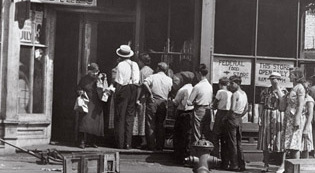 loading
loading
Life at Yale During the Great Depression Manuscripts & ArchivesA breadline in New Haven. View full imageThe Depression influenced both the choice of courses and majors by undergraduates and the fortunes of many graduates. In Yale College, yearlong course elections in English plummeted, from 2,665 in 1926–27 to 1,170 in 1934–35. Courses in government attracted large numbers. One might have expected large enrollments in economics, but after Irving Fisher’s disgrace the department had a dreary reputation. Economics saw a drop from 1,447 course enrollments in 1926–27 to 817 in 1932–33. Students objected to the poor teaching and the use of an uninspired and conservative basic textbook, the infamous Fairchild, Furniss, and Buck, known as “FFB” (although some students suggested the names of the authors should all begin with an F). The authors—all senior Yale economists and administrators—presented fixed conclusions and discouraged independent thinking. “We do not believe that the beginning student profits greatly from that type of discussion which presents arguments on both sides of a controversial question,” the text admonished readers. The book claimed a neutral stance, but it was strongly critical of New Deal economics and concluded with a passionate denunciation of socialism as a threat to capitalism and human liberty. Teaching positions for new PhDs were scarce. Graduate School dean Edgar S. Furniss (who retained the post even after becoming provost) recalled that in the 1920s almost any student with a higher degree could find a teaching job. “But now . . . that the demand for college teachers has been reduced—permanently, it would seem—to much smaller dimensions, the conditions of the times require that our graduate schools make searching reexamination of their vocational purposes and methods.” Forestry dean Henry S. Graves ’92 in 1932 lamented that jobs for foresters were disappearing. But two years later, with the New Deal and its Civilian Conservation Corps in full swing, there were more jobs than graduates. Law dean Charles E. Clark also saw a silver lining in the unprecedented demand for lawyers “with vision adequate to meet the vast problems facing the profession and society in which we live.” He listed with pride the members of the faculty working for the New Deal in Washington. President Angell, however, abhorred the political views and involvement of left-liberal law faculty. In April 1933 Ferdinand Pecora, the crusading general counsel to the Senate Committee on Banking and Currency, asked professors Wesley A. Sturges and William O. Douglas (later a Supreme Court justice) to write a report on “various social and economic aspects of stock market operations.” Angell said such participation could embarrass the university, and, under pressure, Douglas and Sturges declined the invitation. Pecora’s hearings exposed the irresponsibility and malpractices of banking and provided the foundation for sound banking regulations. For his part, Angell was correct; the hearings also discredited men and institutions important to Yale. Throughout the Depression, President Angell’s greatest concern was that the trend toward higher taxes on the wealthy and on estates meant that “the two largest sources of [private university] income . . . will almost inevitably dry up . . . or be gravely impaired.” Speaking at the Harvard tercentennial celebration on a rainy day in 1936, he said: “I was told when leaving the deluge this morning that this was President Conant’s method of soaking the rich. So long as they are Harvard's rich, I don't care. But the endowed institutions of the United States cannot long survive under the threat of unjust taxation.”
|
|